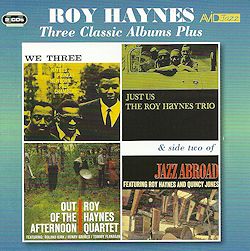CD1
Jazz Abroad
1. Little Leona
2. Miss Mopsy
3. Gone Again
4. Hagnes
Roy Haynes - Drums
Joe Benjamin - Bass
Sahib Shihab - Baritone sax, alto sax
Adrian Acea - Piano
Bjarne Nerem- - Tenor sax
Ake Persson - Trombone
We Three
5. Reflection
6. Sugar Ray
7. Solitaire
8. After Hours
9. Sneakin’ Around
10. Our Delight
Roy Haynes - Drums
Phineas Newborn - Piano
Paul Chambers - Bass
CD2
Just Us
1. Down Home
2. Sweet and Lovely
3. As Long As There’s Music
4. Well Now
5. Cymbalism
6. Con Alma
7. Speak Low
Roy Haynes - Drums
Richard Wyands - Piano
Eddie De Haas - Bass
Out of the Afternoon
8. Moon Ray
9. Fly Me To The Moon
10. Raoul
11. Snap Crackle
12. If I Should Lose You
13. Long Wharf
14. Some Other Spring
Roy Haynes - Drums
Roland Kirk - Tenor sax, manzello, stritch, flutes
Tommy Flanagan - Piano
Henry Grimes - Bass
The Drummerworld website lists Roy Haynes among the "Top 15 Drummers of All Time", and I'm not about to argue. Roy has an individual style and sound which
owes more to instinct than to technique (although he has an excellent technique). He usually makes his presence felt on any recording he takes part in,
often emphasising his presence with a rather echoey - almost tinny - sound on the drums, which gained him the nickname "Snap Crackle". These qualities are
clear in this double CD, which contains three LPs plus the second side of the album Jazz Abroad, which was recorded in 1954 when Haynes was
touring Sweden.
The four tracks from Jazz Abroad are dominated not only by Haynes' drumming but also by Sahib Shihab's authoritative baritone saxophone. In Miss Mopsy, Roy swaps pairs of bars with Shihab (not easy for a drummer). Gone Again is a touching ballad. Roy Haynes's special drum
sound is featured in a longish introduction to Hagnes.
We Three
dates from 1958 and assembles a fine trio, particularly notable for pianist Phineas Newborn, whose technique was legendary. The sleeve-note quotes Roy
Haynes as saying: "Phineas plays full - he uses all ten fingers and 88 keys - perfect for a trio". In Newborn's composition Sugar Ray and the
ballad Solitaire he reminds me of Erroll Garner. But on the eleven-minute After Hours, Phineas displays a feeling for the blues to match
(say) Junior Mance.
Just Us
from 1960 is another trio outing, which seems slightly less interesting than its predecessor because pianist Richard Wyands has a lighter, more
conventional touch than Phineas Newborn. But Roy Haynes' dynamism keeps the pot boiling and his drum solos are as good as melodies. On Con Alma,
he uses mallets on the tomtoms to set a Latin rhythm.
This collection leaves the best till last. Out of the Afternoon was recorded in 1962 with one very special guest: Roland Kirk. Kirk's eccentric
multi-instrumentation has the perfect backing in Roy Haynes' distinctive drumming, plus the experience of pianist Tommy Flanagan and bassist Henry Grimes.
Roy opens several tracks with short drum solos which establish the beat and the mood. In Moon Ray and Snap Crackle, Haynes adds
percussion comments to Grimes' bass solo, and Grimes plays an impressive arco solo on Raoul. Kirk is his usual bundle of delightful
surprises, as in a fine tenor-sax solo on Fly Me To The Moon, a gritty flute solo in Snap Crackle, and an eloquent stritch solo on If I Should Lose You which keeps breaking into double-time.
I actually reviewed Out of the Afternoon
earlier this year with a different coupling. This double album is
a bargain at Avid's usual budget price, which is worth spending for
Out of the Afternoon alone.
Tony Augarde
www.augardebooks.co.uk
